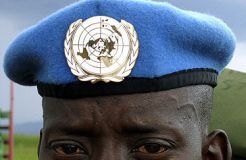Sudan responded ‘favourably’ to Darfur plan – official
Dec 24, 2006 (KHARTOUM) — Sudan has responded “favourably” to a UN plan aimed at bolstering an embattled contingent of African observers in war-torn Darfur, a foreign ministry official said on Sunday.

He added however that “the government’s response is favourable and of a nature that will pave the way, through the UN’s backing for the African force, to a solution to the Darfur conflict.”
Mulki said he had handed the message to outgoing UN Secretary General Kofi Annan’s special envoy, Ahmadou Ould Abdallah, on Saturday.
The Mauritanian UN diplomat was dispatched to Sudan last week in a bid to clinch Khartoum’s approval for a three-phase UN plan aimed at bolstering the struggling AU force.
The compromise plan — drafted after President Omar al-Beshir consistently rejected any UN troop deployment — is supposed to lead to a “hybrid” AU-UN peacekeeping force, although differences of interpretation remain.
Mulki did not explicitly say however that Khartoum’s response to the UN plan amounted to an acceptance of a deployment of UN peacekeepers alongside the AU troops.
Beshir had vehemently opposed the presence of any UN troops in Darfur, accusing the West of seeking to prepare an invasion of his country.
Observers argue that the Khartoum regime — which stands accused of genocide by Washington — fears any UN deployment could pave the way for arrest warrants by the International Criminal Court.
The United States had given Khartoum until January 1 to accept the UN package or face coercive action to end the conflict in Darfur, which has killed at least 200,000 people and displaced two million in four years.
Annan, who relinquishes the leadership of the world body on January 1 after eight years at the helm, was keen to achieve a breakthrough in the Darfur crisis before the end of his tenure.
On Friday, Annan said reports from Khartoum “encourage me to think we may tomorrow receive a green light from President al-Beshir for a full ceasefire… and deployment of the proposed hybrid African Union-United Nations force to protect the population.”
Mulki said he was hopeful Beshir’s stance on the UN support plan would help rekindle the stalled political process in Darfur.
A peace agreement was signed in May between Khartoum and the main rebel faction from the Sudan Liberation Movement, but the two other negotiating rebel groups refused to endorse the deal and violence continued unabated.
The Sudanese army said it killed 200 rebels while repelling an attack in Darfur last week, in what would be the deadliest single military operation reported by the regime since the conflict started.
The conflict erupted in February 2003 when ethnic minority rebels complaining of marginalisation launched an uprising, which was fiercely repressed by government troops and allied militias.
The fighting resulted in what the UN has described as the world’s worst humanitarian disaster and recently spilled over into neighbouring Chad and the Central African Republic
(AFP)
